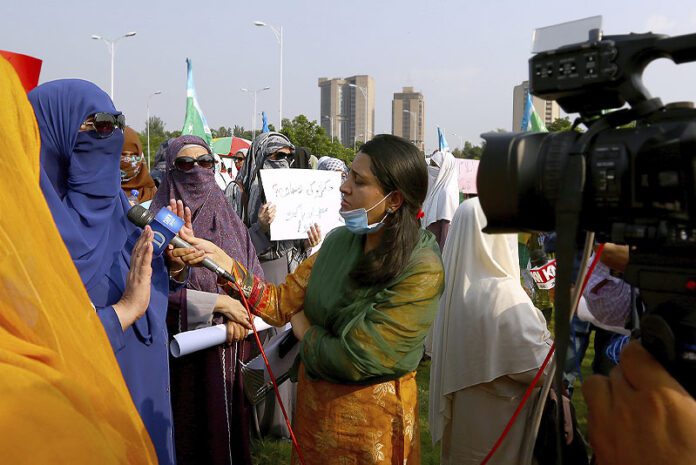Journalism is a brave profession, especially in a country like Pakistan. Where those who speak the truth are not safe, whether they are female journalists or male journalists. There are problems for women everywhere but in journalism they face online bullying in addition to their workplace. In a country like Pakistan, it is crucial to give female journalists a platform to practice their right to freedom of expression without fear of retaliation.
In South Asia, particularly Pakistan, the media business is primarily dominated by men reflecting a gendered world, where women journalists are more vulnerable to violence, attack, and censorship. According to the Pakistan Federal Union of Journalists (2020), women make up less than 5% of Pakistan’s estimated 20,000 journalists.
Furthermore, the Gender Gap Report (2021) ranked Pakistan 142 out of 146 countries, which means Pakistan has failed to fulfill the rights of women whether they are working women or housewives. It clearly shows that there is a huge difference in women’s and men’s access to resources, status, and well-being where men are usually given preference.
Journalism is considered one of the most dangerous professions in the world. In addition to verbal attacks, numerous women journalists have also been assassinated. In 2019, Urooj Iqbal worked for a local newspaper and was shot by her husband for not quitting her job. She wanted to be the first Pakistani Female Journalist to launch her newspaper. She paid the price of her dream. The criminal has never been arrested to date. Just a year later, Baloch Journalist Shaheena Shaheen was killed by her husband in September 2020, the second female journalist assassinated by her husband who claimed he had killed her in the name of ‘honor.’ Honor killings are considered routine for people here. Shaheen was a famous and strong supporter of Gender Equality in Baluchistan. Also, she was threatened by Baloch Militants to quit her job.
Another way of attacking, discouraging, and humiliating female journalists is cyberbullying. It is the most common tactic to attack female journalists using derogatory terms for their character assassination and threatening them and their families. When it comes to online trolls, Pakistan has ranked among the top five worst offenders monitored by the Coalition for Women in Journalism (CFWIJ).
Moreover, frequent campaigns on Twitter are also launched against them. In 2022, Gharidah Farooqi was at the center of the harassment campaign. It was nothing out of the ordinary for her as she has dealt with years of online abuse during her 20-year career.
Benazir Shah, a senior reporter with Geo News said that she never faced such trolling and online abuse until a government official accused her of false reporting, and then the online trolling started right away.
Asma Shirazi is a well-known broadcast journalist and talk show host in Pakistan. She said “Online harassment is a constant tool to use against women, especially women journalists to put them under pressure. With time, I have come to know that this is such a huge psychological weapon, which is being used against journalists so that their ability to think and understand becomes affected by the increase of pressure.”
Not only that but women journalists are also discouraged from filing complaints or expressing discontentment and displeasure in facing uncomfortable working conditions which include cultural barriers, non-provision of maternity leave in all news organizations, absence of job security, absence of anti-harassment inquiry committee in all news organizations, uncooperative colleagues, gender discrimination, harassment at their workplace and in the field.
They face ongoing challenges from male colleagues, including belittling, diminishing work, and denying them space. Many men believe women are less capable than men. Wage inequalities exist globally, impacting women journalists and women in various sectors, where women are not paid the same despite equal education and experience.
According to World Press Freedom (2022), Pakistan ranked 157 out of 180 countries. Pakistan has fallen to 12 places and in 2021, Pakistan was ranked 145. Instead of improving the freedom of the Press in Pakistan, it has gone from bad to worse.
Journalism is meant to be free. The government and civil society should take certain steps to improve the current situation of Journalism in Pakistan especially for female journalists. Moreover, the media houses should be accountable for the safety of female journalists. In a country like Pakistan, it is crucial to give female journalists a platform to practice their right to freedom of expression without fear of retaliation.




